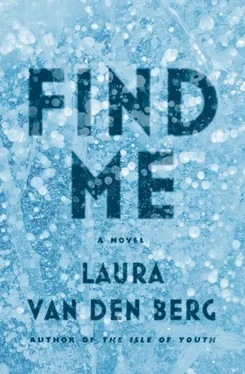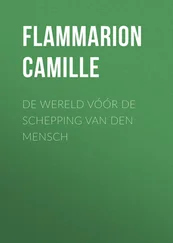GOOD HEALTH IS CONTAGIOUS AND YOU HAVE CAUGHT IT, the Pathologist says on the speakers, his latest meditation.
I turn on the TV. A show called Mysteries of the Sea is just starting on the Discovery Channel, the twins’ favorite station. A woman stands on the deck of a white fishing boat with a navy blue hull, speaking into a walkie-talkie. I hear wind and static, a tumble of voices. The railing is dotted with orange lifesavers.
A scattering of birds in the sky. They cross over, white wings flapping, disappear from sight. The camera pulls away and for a moment the boat is just a spot on the water. A voiceover says it’s spring in Las Tumbas, Cuba.
This woman is wearing a baseball cap that says AHOY and a blue jumpsuit and black boots, the laces pulled tight. On the deck, she discusses coordinates with her chief engineer. I hear official-sounding words like “dew point” and “barometric pressure.” The captain keeps her eyes on the water, even though there is nothing around them except dark, undulating waves.
She is slim, but her sleeves are cuffed and I can see the muscle in her arms. Her hair is an inky knot at the base of her neck. She points the walkie-talkie antenna at something off in the distance. The chief engineer nods.
This captain, she is striking, serious. The more I look at her, the more I can’t stop looking.
I get on the floor, on my hands and knees. A primal feeling takes hold and I move closer to the TV on all fours. The paper lei swings from my neck. I get close to the screen, so close I can feel static on the tip of my nose.
There are things aging changes and things it preserves. It’s like looking into a mirror and having my future self projected back at me. Still, it takes me the entire episode to believe what I am seeing.
In an hour of TV, here is what I learn about my mother:
Her name is Beatrice Lurry. She is an underwater archaeologist, a member of the Institute of Nautical Archaeology. A ship detective. She is the person who is called in after a ship has gone missing and the coast guard has failed in their pursuit. She has a special talent for searching.
A special talent for searching, for finding, but not for holding on. I am proof of that.
A Russian ship, named after an old film star, that vanished on its way to the Dominican Republic — recovered by my mother off the coast of Newfoundland. A cabin cruiser that disappeared in the Gulf of Mexico. That vessel had a unique gravity weight, was designed to be unsinkable, but my mother discovered that it did in fact sink, as did the yacht that went missing in the Indian Ocean, drowning its sixteen passengers.
Of course, it’s not every day a ship goes missing. When she doesn’t have a live case, she searches for the wrecks, the long lost — the cruise liner that disappeared in the Arctic Ocean a hundred years ago; the merchant vessel abandoned in the South Pacific in the fifties. The wreck that made her famous was found near the Wallabi islands: in the hold she uncovered a mass grave, the casualties of a mutiny.
She got her start on the wrecks, but it’s the live cases she loves best, the urgency of the search.
In that hour of TV, I learn about her first expedition, when she was part of a maritime team looking for a steamship that sank in Lake Michigan a century ago, during a storm. They found the ship nearly intact, thanks to the freezing lake water. She was one of the technical divers, in charge of taking photos. She dove two hundred and fifty feet below the surface.
Once she was down that deep, she never wanted to leave.
I learn that she takes medication for migraines. When she is struck by one, she has to lie down in a dark room with a wet towel over her eyes. When she’s not at sea, she lives on an island called Shadow Key, just beyond the coast of Key West. The only way to reach the island is by boat. There are images of a red houseboat with porthole windows docked in a still harbor. She can’t sleep in a regular house, can’t sleep in anything that doesn’t float.
“Water is neutral,” my mother tells the camera. “It doesn’t have wants.”
On this voyage, she has a live one: The Estrella , a freighter that vanished en route from Miami to Argentina, an episode filmed when a memory-destroying epidemic was still something that existed only in the apocalyptic corners of our imaginations or didn’t exist at all.
The Estrella was last spotted near Las Tumbas, in the Gulf of Mexico. When the vessel never reached its destination in the Argentine province of Santa Cruz, the cargo and the crew unaccounted for, including the captain’s wife and teenage daughter, my mother got the call.
On the ship deck, she watches the sky and I notice the long grace of her neck. In the Common Room, I extend my neck, feel the muscles in my throat stretch, and search for resemblance. Midway through the episode, a storm blows through and the clouds shimmer with lightning.
During the storm, my mother works in the lower cabin, a tiny wood-paneled room. Black cords snake across the floor and around the metal legs of a desk and a chair. Graphs are tacked to the walls. A cot with a white pillow and a yellow blanket is pressed along one side of the room. A seaside painting hangs above it. In the center of the room, a marine radar beeps; a green circle flashes on the screen. My mother takes off her AHOY cap and shakes out her hair. Her roots have been bleached auburn by the sun. I see the familiar middle part, the high forehead. My inheritance.
How strange it is to watch her past become animated, to no longer wonder where and how her life was unfolding, but to know.
She sits hunched over a notebook. A circular clock, the hands shaped like oars, and a map of the Atlantic hang on the wall behind her. Points in the water have been marked with black pushpins. The clock slides back and forth as the boat rocks on the ocean. The low light brings out the shadows in her face and for a moment, that grass scent comes back to me. She switches on a tape recorder and starts talking about microbursts. I consider the way the start of a bad feeling feels, that little pop of dread — microburst, what a perfect name for that feeling, even though I know my mother is talking about things that don’t have to do with the body but with the sea. Her voice is soft. There is the hint of something troubling her in the back of her throat. Her knuckles are red and splitting. Her fingernails are cut past the quick.
I wonder if she ever thinks about me. What she remembers. If she dreams of finding the captain’s daughter alive and well, floating in a lifeboat in the middle of the sea.
* * *
As the weather gets colder, as the recovery progresses on the outside, Floor Groups four and six become harder to control. It starts when a patient from six, a young guy from California, has a dream. In the dream, he wakes in the night to find a Native American man standing at his bedside. His skin is crusted with dirt, like he’s just been dug up from a grave. He’s wearing a big headdress with feathers and tiny animal skulls. He leans over this patient and breathes breath as hot as death in his face and tells him to wake the fuck up.
“And I did,” this guy tells us during morning yoga, when we’re all supposed to be in Child’s Pose. “I woke up.”
Now this man is claiming Floor Groups four and six are doing more work than the other patients; he has become a representative. In a Community Meeting, he asks Dr. Bek if he has any idea what kind of crap the patients leave behind in the Dining Hall. Is he aware that under the tables they find crumpled paper napkins and plastic forks, the tines crusted with food, and corn niblets that have been smashed like bugs? Is he aware that microwaves leach the nutrition from our food? That cleaning microwaves three times a day could expose them to carcinogenic radiation?
Читать дальше












